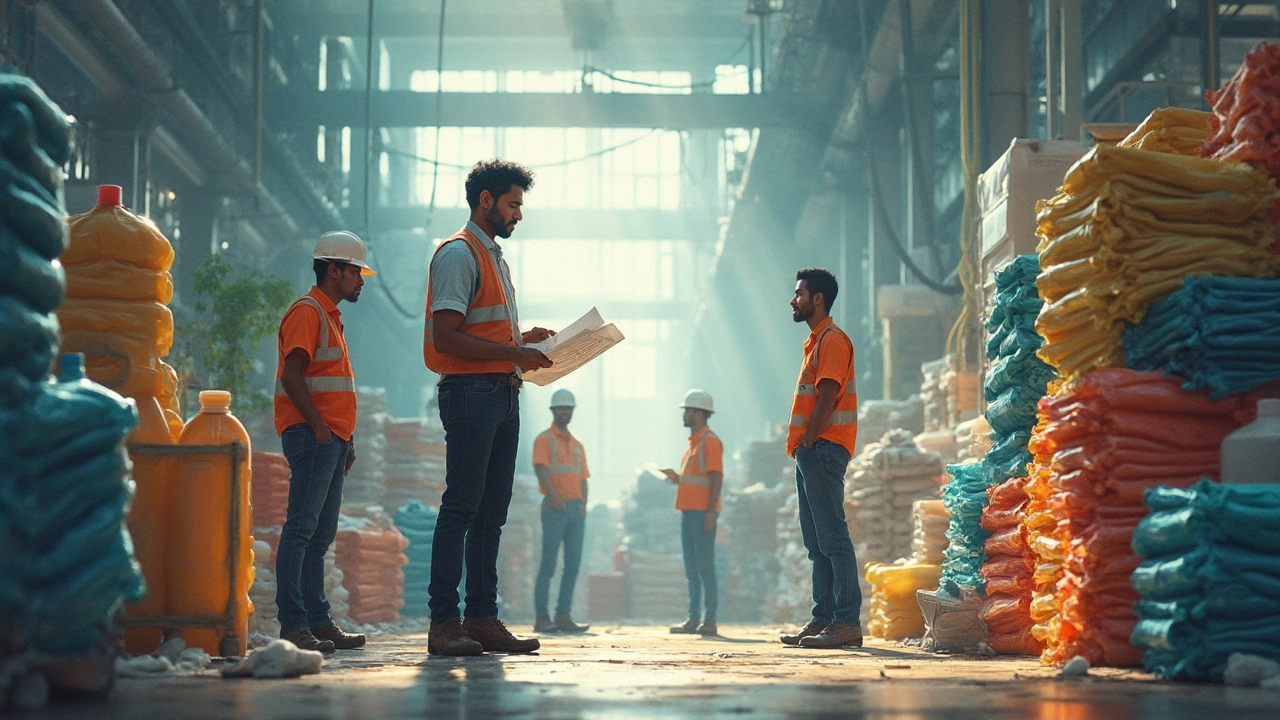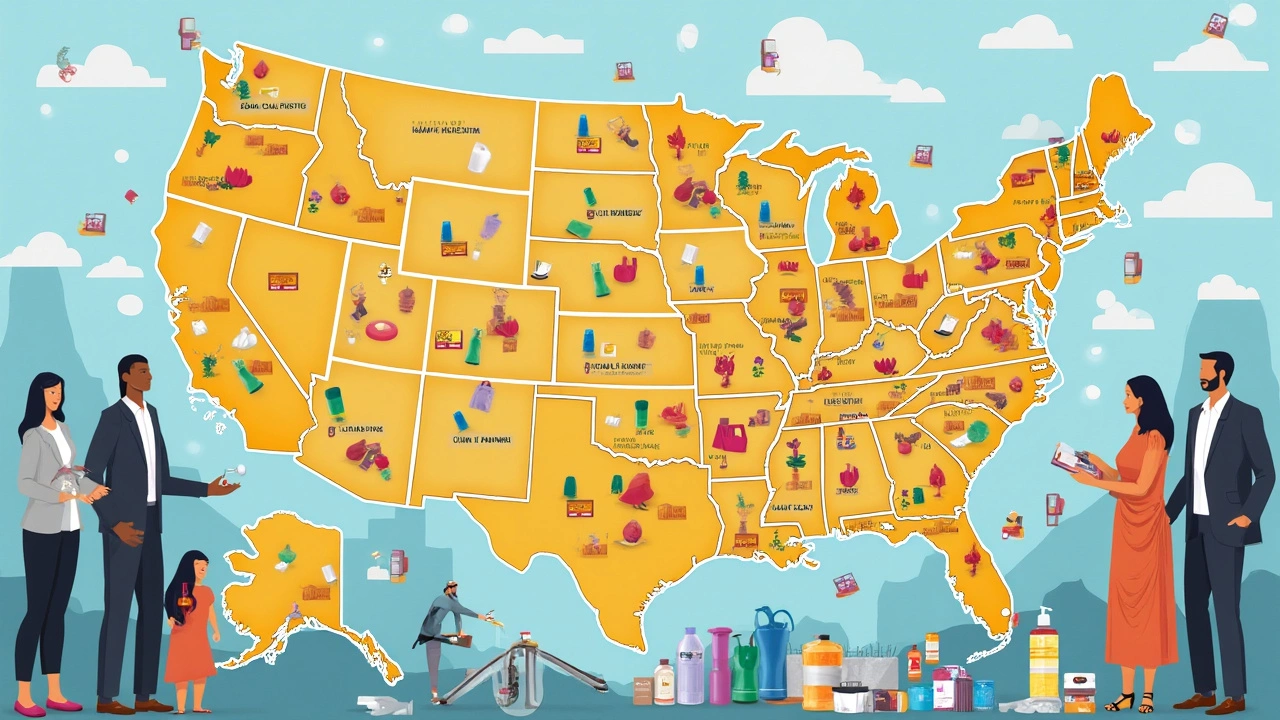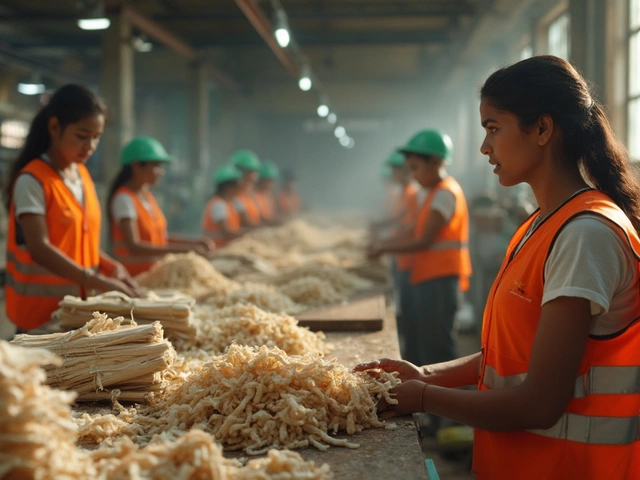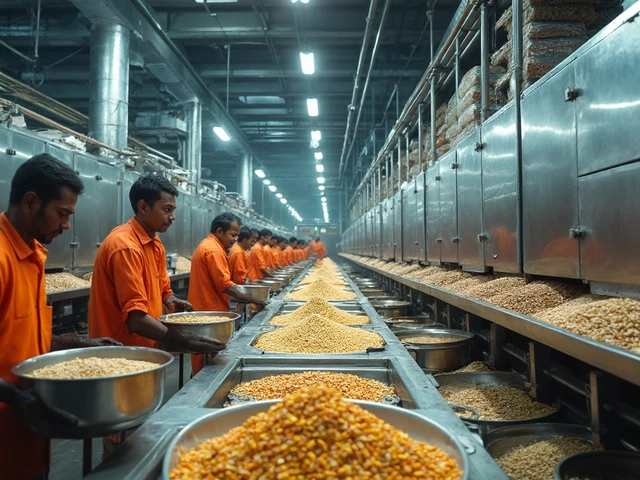Plastic bags might be part of your daily routine, but in a growing list of US states and cities, they’ve quietly disappeared from grocery store checkouts. More places are jumping on the plastic ban train—especially when it comes to single-use items like bags, straws, and even foam containers. But the rules aren’t the same everywhere. Some states go all in, while others stick to just a few cities or counties making their own rules.
If you’re running a business or even just planning a cross-country road trip, keeping up with where you’re allowed to use that takeout bag or cup can feel like a head-scratcher. It matters even more for plastic manufacturing companies, since changes in the law can flip the market almost overnight. The real kicker? Not every ban covers every type of plastic, so knowing the details could save you money—and a lot of hassle.
- Statewide Bans: Who’s Leading the Charge?
- City-Level Crackdowns and Unique Rules
- What Plastic Products Are Actually Banned?
- Tips for Navigating Bans if You Make or Sell Plastic
Statewide Bans: Who’s Leading the Charge?
A handful of states have stepped up with tough rules on single-use plastics, making them trendsetters when it comes to plastic bans. They usually target bags, but some also crack down on straws, foam food containers, and even microbeads. Here’s where it really matters: if you sell or make plastic products in these states, you’ve got new regulations to follow—no exceptions for big chains or small businesses.
Check out this table to see which states already have broad bans in place and what plastics they’re actually going after:
| State | Year Enacted | Banned Single-Use Items |
|---|---|---|
| California | 2014 (bags), 2022 (expanded) | Plastic bags, plastic straws on request, polystyrene foam, some takeout containers |
| New York | 2020 | Plastic bags |
| Oregon | 2020 | Plastic bags, plastic straws on request |
| Vermont | 2020 | Plastic bags, straws, stirrers, polystyrene food service |
| New Jersey | 2022 | Plastic bags, paper bags (large stores), polystyrene foam |
| Colorado | 2024 | Plastic bags, polystyrene foam |
California led this charge, banning thin plastic bags way back in 2014. By 2022, the state doubled down—now certain recyclability and labeling rules even affect manufacturers outside of California if they want to sell stuff there. New Jersey went even further, banning both plastic and paper bags in big supermarkets to force shoppers toward reusable options. In Vermont, you won’t find plastic stirrers or foam takeout containers anywhere. Colorado’s rules turned strict in 2024, making life interesting for anyone in the packaging or restaurant business.
Here’s what you should keep in mind if you operate in these states:
- Compliance is not optional. Fines can add up fast, with some states imposing hundreds or even thousands of dollars per violation.
- Some places have small exceptions (like straws for medical needs), but you can’t count on loopholes for most products.
- If you manufacture outside these states but ship products in, your goods can still be blocked by these laws.
Staying up to date on local laws is everything. The plastic bans movement keeps spreading, so what’s banned now could expand to more items next year.
City-Level Crackdowns and Unique Rules
Here’s where things get interesting. While some states drag their feet on plastic bans, a bunch of cities are making their own rules—sometimes way tougher than anything at the state level. If you’re thinking these rules only exist in California or New York, that’s not the case. Cities across Texas, Florida, and even states with no statewide bans at all are putting out bold local regulations.
San Francisco has one of the earliest and most famous plastic bag bans—back in 2007, they started only letting you use compostable or recyclable bags at checkout. Seattle followed up with bans on single-use plastics like straws and utensils in restaurants. New York City took a stab at plastic foam containers, and places like Boston and Chicago have local bans that are pretty strict on bags and takeout supplies.
Phoenix, AZ might surprise you: it banned polystyrene foam (think takeout clamshells) in all city facilities. Miami Beach? Banned plastic straws in public beaches and parks. It’s different from town to town, but these local moves add up fast if you’re shipping or selling products nationwide.
Check out how some major cities compare:
| City | Main Plastic Ban | Year Enacted |
|---|---|---|
| San Francisco, CA | Plastic bags (retail), straws, utensils | 2007 (updated 2019) |
| Seattle, WA | Plastic bags, straws, utensils | 2012 (bags), 2018 (straws) |
| Boston, MA | Plastic bags | 2018 |
| New York City, NY | Plastic foam containers, plastic bags | 2019 (foam), 2020 (bags) |
| Miami Beach, FL | Plastic straws (public areas) | 2019 |
| Phoenix, AZ | Polystyrene foam (city facilities) | 2021 |
Some cities go further than just bans—they also require stores and restaurants to charge for paper bags or mandate compostable alternatives. That means one city might ask you to pay 10 cents for a paper bag, while the city next door includes compostable options for free.
- Don’t assume statewide rules cancel out local bans—sometimes, they layer on top of each other.
- If you’re in the plastics business, double-check city laws before selling or shipping there.
- Remember, some cities are quick to update their ordinances, so what’s allowed this year might not fly next year.
Navigating these patchwork rules keeps both businesses and shoppers on their toes. If you don’t want a fine, or worse, wasted inventory, keeping tabs on city ordinances is just as important as state laws.

What Plastic Products Are Actually Banned?
If you think all plastics are treated the same, think again. The real targets for bans are products used once and then tossed out. These are the ones littering beaches, clogging sewers, and costing cities big bucks to clean up. Different states—and sometimes even different towns—go after different items, but a few types of plastic almost always make the list.
- Plastic bags: The big one. California, New York, Oregon, and a handful of other states have said goodbye to single-use plastic bags at grocery stores. Most of these bans let you buy paper bags (sometimes for a fee), but thick reusable plastic bags can slip through the cracks if they meet minimum durability standards.
- Polystyrene foam (Styrofoam) food containers: Cities like New York, Washington DC, and several California communities ban these. Fast food clamshells and those classic white coffee cups are history in a lot of cafeterias and delis.
- Plastic straws: Almost every national coffee chain in California now hands out paper straws or only gives plastic ones if you ask. Some cities have stricter straw bans that hit every restaurant.
- Plastic stirrers and utensils: Miami Beach, Seattle, Malibu, and other cities cracked down on plastic forks and drink stirrers. Usually, this means restaurants have to switch to wood or compostables for takeout.
- Microbeads: These tiny plastics, once common in exfoliating face washes and toothpaste, have been banned nationwide since 2015 under the Microbead-Free Waters Act.
Just so you have an easy comparison, here’s a quick look at what’s banned where, using a few examples:
| Product | Ban Location(s) | Notable Facts |
|---|---|---|
| Thin plastic bags | CA, NY, OR, CT, DE, ME, HI (plus major cities) | Fees or thicker bags often allowed |
| Polystyrene foam | NYC, DC, MD, NJ, parts of CA & FL | Some places ban all foam, others just food containers |
| Plastic straws | CA, WA (Seattle), FL (St Pete), dozens of towns | Often allowed on request (especially for disability) |
| Microbeads | US-wide | Banned for use in rinse-off cosmetics since 2015 |
One thing to remember: every ban carves out exceptions. Grocery stores in LA might hand you thick recycled plastic bags that count as "reusable." Restaurants in some areas keep backup plastic straws for people who need them. Fast food chains use compostable forks where plastic forks get the boot. The rules can get tricky, so double-check the details if you’re making, selling, or handing out any of these products.
Tips for Navigating Bans if You Make or Sell Plastic
If you’re in the business of making or selling anything plastic, these shifting bans can feel like a moving target. The last thing anyone wants is to ship a truckload of banned straws to New Jersey or foam containers to San Diego. The key moves? Stay flexible, stay informed, and don’t count on bans being the same everywhere.
First, know your geography. As of June 2025, ten states—including California, New York, and Oregon—have state-level bans on some single-use plastics, but that’s just the start. Over 400 cities have their own, sometimes stricter, rules. It’s not just about bags either. New Jersey, for instance, ditched not only plastic bags but also paper bags in large grocery stores. In Hawaii, all the main counties ban non-biodegradable plastic bags and foam foodware, while Florida doesn’t allow local bans at all.
Don’t skip the details about what’s banned. A bag accepted in one state may land you a fine in another. Some bans hit only thin grocery bags, others target straws, stirrers, and even packaging peanuts. Recyclability does not always save you—San Francisco, for example, outlaws all expanded polystyrene foam, regardless of whether it’s labeled recyclable.
If you want to keep your business running smoothly, here’s what to do:
- Stay on top of plastic bans—set up alerts for changing rules where you sell or distribute.
- Rethink what you’re making: can you swap in recycled, compostable, or paper-based materials?
- Check the fine print before rolling out new products—some states require certain labels or thickness for bags, or only allow compostable utensils.
- Team up with legal or compliance consultants, especially if you sell in multiple states.
- Keep customers in the loop. Posting quick guides at checkout or on packaging helps avoid confusion and keeps brand trust high.
Here’s a quick glance at how these bans stack up in a few major states. Numbers are for statewide bans in effect as of June 2025.
| State | Plastic Bags Banned | Plastic Straws Banned | Foam Food Containers Banned | Special Rules |
|---|---|---|---|---|
| California | Yes | Yes (on request only) | Yes | Bans also target produce bags and utensils |
| New York | Yes | No state ban | No state ban | Local rules may be stricter |
| Oregon | Yes | Yes (by request) | No state ban | Retailers must charge for paper bags |
| New Jersey | Yes (also paper bags banned) | No state ban | Yes | Applies mostly to large grocery stores |
| Hawaii* | Yes (all counties) | No state ban | Yes (all counties) | No statewide law, but all counties aligned |
*Hawaii doesn’t have a state law, but every major county has similar bans, so it works out the same.
If you’re unsure about a new rule, double-check with the city or state websites before rolling out fresh inventory. Regulations can move fast—today it’s bags, tomorrow it could be packaging wrap or microbeads. Those who adapt quickly end up with less wasted inventory and fewer surprises. It’s not just about compliance—it’s about keeping your business ahead of the curve while others scramble to catch up.





